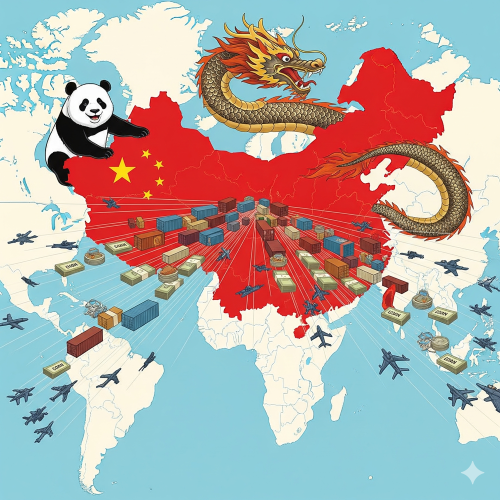How are local businesses and workers responding to increased Chinese influence in their domestic markets?

Local businesses and workers have a complex and often contradictory response to increased Chinese influence, viewing it as both a source of opportunity and a threat. While some appreciate the jobs created and the availability of cheap goods, others express frustration over labor practices, competition, and a perceived lack of long-term development.
Worker Responses: A Mix of Opportunity and Exploitation
For many local workers, Chinese projects, particularly large-scale infrastructure and mining ventures, are a significant source of employment. These projects can provide much-needed cash-earning jobs, often in economies with high unemployment rates. A 2014 study of 10 African countries found that Chinese aid projects increased local employment by 2 to 3 percentage points within the first two years. This is a powerful, tangible benefit for individuals and communities.
However, a closer look at labor practices reveals deep-seated grievances:
-
Low Wages and Poor Working Conditions: Workers frequently complain about lower pay and longer working hours compared to other foreign or local companies. Reports from countries across Africa and South America often cite a lack of safety standards, which has led to protests and, in some tragic cases, fatalities.
-
Limited Skills Transfer: There's a persistent perception that Chinese companies import a large number of their own workers, especially for skilled and managerial roles, leaving local employees in low-skilled positions. This limits opportunities for skills and technology transfer, which are crucial for long-term economic development.
-
Cultural and Social Tensions: The lack of cultural integration between Chinese expatriates and local workers can lead to friction. Complaints about discrimination and a lack of respect from Chinese managers are common, leading to social tensions in some communities.
Overall, while jobs are created, workers often feel that the benefits are short-term and don't contribute to their long-term professional growth.
Local Business Responses: Competition and Exclusion
Local businesses, from small-scale traders to large manufacturers, have had a particularly mixed reaction to Chinese influence.
-
Small Businesses and Traders: In many markets, Chinese traders have set up shop, selling inexpensive imported goods. For local vendors, this represents a significant challenge. Many feel that they can't compete with the scale and lower prices of Chinese products, which has led to the displacement of some local entrepreneurs and businesses.
-
Manufacturing and Industrial Firms: The influx of cheap Chinese imports has had a detrimental effect on domestic manufacturing industries in both Africa and South America. Local producers of textiles, shoes, and household goods, for example, have struggled to compete with the low-cost alternatives from China. In some cases, this has led to a call for governments to impose tariffs or other protectionist measures to protect local industries.
-
Limited Supply Chain Integration: A major point of contention for local businesses is the tendency for Chinese firms to operate in self-contained ecosystems. They often import most of their materials, machinery, and even food from China, limiting opportunities for local businesses to become suppliers or partners. This prevents the development of robust backward and forward linkages that are vital for creating a healthy, diversified economy.
While some large local firms have successfully partnered with Chinese companies, the overall sentiment among small and medium-sized enterprises is one of being out-competed and excluded from the supply chain.
The Broader Picture: Navigating the Trade-offs
The varied responses from local businesses and workers highlight the central dilemma faced by nations engaging with China: the trade-off between short-term economic gains and long-term developmental risks.
-
Acceptance of the Status Quo: Many people accept the current situation because Chinese investment fills a clear need for jobs and infrastructure. They recognize that, in the absence of a viable alternative from Western countries or local governments, Chinese projects are a necessary evil.
-
Calls for Government Action: The negative aspects of Chinese influence have fueled popular movements and demands for governments to enforce stricter labor and environmental laws. Local civil society organizations and trade unions have become increasingly vocal in their calls for greater transparency in Chinese-funded projects and better protection for local workers and businesses.
-
Seeking a Better Balance: The ultimate goal for many is not to sever ties with China but to rebalance the relationship. They want to ensure that Chinese investments lead to a greater degree of local content, technology transfer, and equitable labor practices that truly contribute to sustainable development rather than merely reinforcing a commodity-based economic model.
In conclusion, the reactions of local businesses and workers are a barometer for the on-the-ground impact of China's influence. While they appreciate the opportunities presented, their frustrations reveal the need for better governance, stronger labor protections, and a more inclusive economic model to ensure that Chinese engagement benefits local populations in the long run.
- Questions and Answers
- Opinion
- Motivational and Inspiring Story
- Technology
- Live and Let live
- Focus
- Geopolitics
- Military-Arms/Equipment
- Sicurezza
- Economy
- Beasts of Nations
- Machine Tools-The “Mother Industry”
- Art
- Causes
- Crafts
- Dance
- Drinks
- Film/Movie
- Fitness
- Food
- Giochi
- Gardening
- Health
- Home
- Literature
- Music
- Networking
- Altre informazioni
- Party
- Religion
- Shopping
- Sports
- Theater
- Health and Wellness
- News
- Culture

